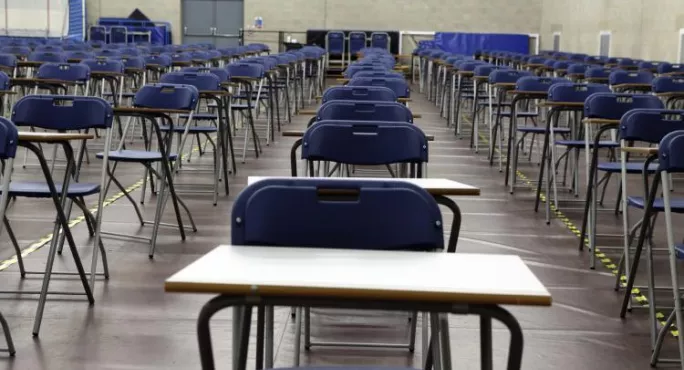GCSEs and A levels 2021: Can exams ever be fair?
Share
GCSEs and A levels 2021: Can exams ever be fair?
When the government announced on Monday that exams in England would be going ahead in 2021, but with a three-week delay to give students more time to prepare, teachers responded with consternation.
Many pointed out the injustice of trying to run exams after some students, and some entire school cohorts, will have had a year of disruption as a result of local lockdowns or the need to self-isolate, whereas others may have attended school as usual. Surely, this makes any exam that tries to compare the performance of students who have had such different experiences inherently unfair? Well, yes. But then, exams are always unfair - it is just that in other years we don’t really talk about it.
There are many things that make exams unfair. It is unfair if you find yourself in a school where your learning is disrupted by poor behaviour. It is unfair if you are unlucky enough to go to a school where policies hamper teachers, or you’re just unlucky enough to have a teacher who is less good at their job than other teachers.
Will GCSEs and A levels be fair in 2021?
One thing that makes exams really unfair is the unreliability of assessment. This excellent blog post from Alex Ford looks at the chances of two examiners reaching the same grade on an exam paper.
For some subjects, like maths, the odds are pretty good, but for many others, such as English, the chances of them agreeing is little over 50 per cent. The same answer would lead to a grade 4 being awarded from one examiner and a grade 5 from another.
One examiner’s grade meant that the student went to the college course of their choice whereas the other meant they couldn’t. This is not the result of exams taken owing to the disruption of a pandemic; this is a problem baked into the system, which we usually ignore, because facing it would be inconvenient - it would mean that we’d have to address it.
However, the biggest problem is that no other system seems to be any more fair. Replacing exams with coursework just creates new kinds of unfairness. Students with more supportive parents, or who go to schools where there is increased pressure to give excessive support, will do better.
On top of that, we still have the problem that we did with exams. Will whoever is marking the coursework reach the same grade that another teacher would have done? This problem is there with any kind of assessment that relies on some kind of criteria, but with teacher assessment we can also add the problem with unconscious bias entering the system. That is also unfair.
Read more:
- GCSEs 2021: A guide to adapting your planning
- Exams 2021: How do we keep students motivated?
- Coronavirus and exams: 8 key questions about the update
We could try to avoid some of the consequences of the unfairness by replacing terminal exams with more exams that appear throughout the course. This would mean that any over or under marking is more likely to be averaged out by the time students get a final grade. Unfortunately, experience tells us that modular exams can quickly dominate a curriculum with students feeling that all they are doing is being prepped for yet another exam in a few months’ time. Can we really do this for every subject students are studying? Would we want to? Is turning their education into a series of exams really fair?
I would suggest that the problem this year, or any year, isn’t really with the exams themselves but with the stakes that we attach to them for students, teachers and schools alike. We need to stop pretending that any assessment can ever tell us anything concrete about either what a student knows or how they compare to other students. They are, at best, a very rough guide to where that student sits in comparison with their peers. We can probably say that a student who is awarded a 3 is less “good” at that subject than a student who was awarded an 8, but possibly not less good than one awarded a 5.
Discussions about whether a particular assessment method is fair seem to miss the point. We are asking assessments to do something that they simply can’t do. So, please can we stop arguing about replacing one flawed method with another and instead start asking questions about the role of assessment in the education system, whatever form it takes.
Mark Enser is head of geography and research lead at Heathfield Community College. His latest book, Generative Learning in Action, is out now. He tweets @EnserMark




